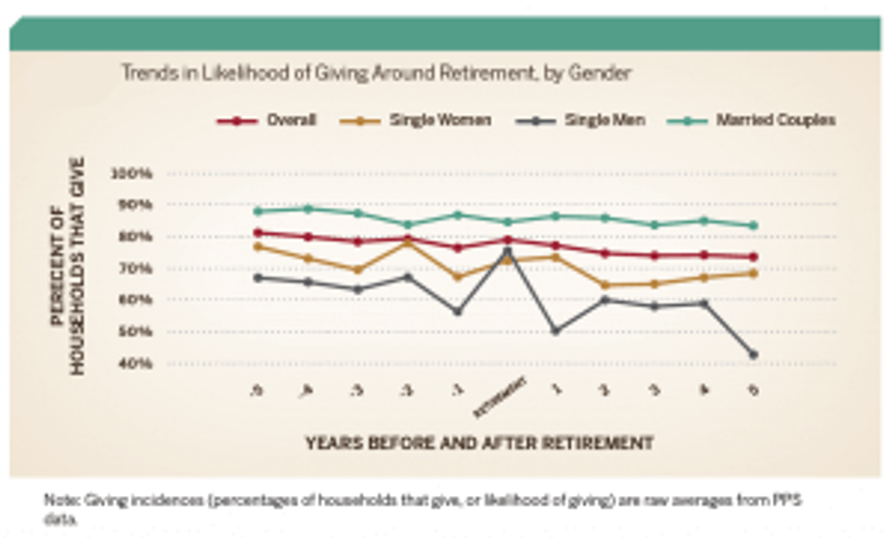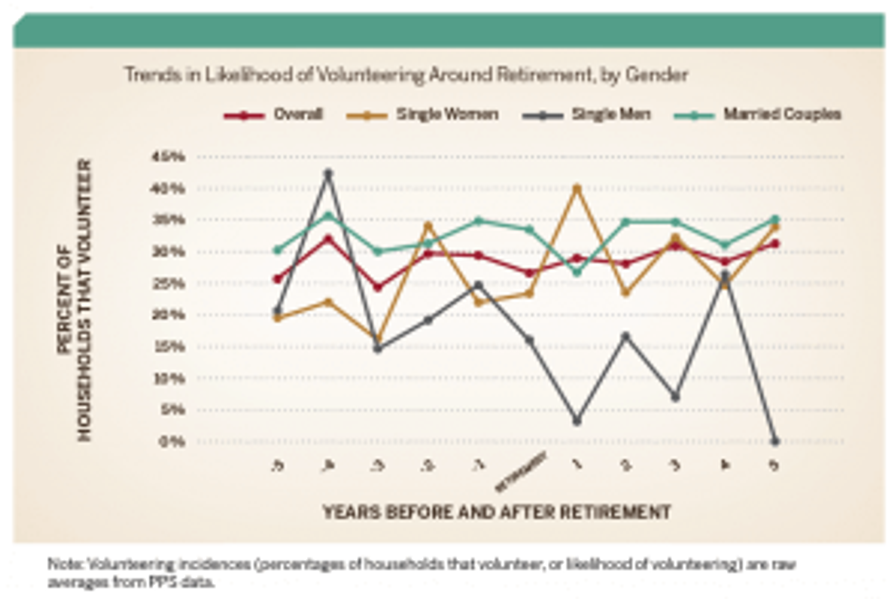What Retirement Means for Charitable Giving and Volunteering
A new study reveals a fascinating trend among single men in retirement
Once retirement begins and people tend to have more time but less money than when they were working, they typically cut back on spending. An intriguing new survey has found, however, that during the first five years of retirement, their rate of charitable giving remains pretty stable and they often also give as much as when they first retired — except for single men, who become less generous.

The survey from the Women’s Philanthropy Institute — How Women and Men Give Around Retirement — found a similar pattern regarding volunteering; people tend to volunteer as much or more in the first five years of retirement as when they first retire, except for single men whose volunteering rate drops dramatically.
Charitable Giving After Retirement Starts
“What’s so great is the study shows that giving to charities pretty much stays stable before and after retirement,” said Debra J. Mesch, director of the Women’s Philanthropy Institute at the Indiana University Lilly Family School of Philanthropy at IUPUI. “Giving is ingrained in our culture.”

In fact, 70 percent of the $410 billion in total U.S. charitable giving last year was by households, according to the recent Giving USA report.
The sample for the Women's Philanthropy Institute report comes from the Philanthropy Panel Study, which tracks the same families’ charitable giving biennially. The Indiana University Lilly Family School of Philanthropy and University of Michigan’s Institute for Social Research collected data from 2001 through 2015 for 6,012 individuals aged 55 to 101.
Single women tend to give far more to charity than single men during the decades before retirement and that trend continues into retirement, the survey said. Before retirement, about 77 percent of single women give to charity vs. 66 percent of single men. After retirement, 76 percent of single women give and 67 percent of single men do. (Married couples and single women consistently give to charity more than single men.)
Although, the researchers say, spending on housing, transportation and education declines significantly in the years around retirement, their survey report said “charitable giving appears to buck this trend.” As the chart below shows, the percentage who give to charity remains pretty flat in the first five years of retirement (roughly 75 percent of households and 85 percent of married couples). About 70 percent of single women give to charity during those years.
Single Men in Retirement: Not Dependable Givers
But it’s a different story for single men: At retirement, the survey found, about 75 percent give to charity. But by year five of retirement, only about 40 percent do.
The amount that single men give to charity in retirement fluctuates far more than for couples, households overall and women, too.
At retirement, single men give about $1,200 a year to charity, on average (by contrast, couples give $4,000). Giving for single men soars to roughly $3,500 in year two of retirement, then plummets to under $1,000, which is also where it winds up in year five.

The volunteer rate for single men in retirement (in the other chart) also fluctuates far more than for single women, married couples and retirees overall. At retirement, the survey said, about 15 percent of single men volunteer. That falls to under 5 percent in year one, rises to 25 percent in year four and is nearly 0 percent in year five.
“The volatility rate of single men in retirement was one of the most unique findings of the study,” said Mesch. “That really surprised us.”
Ken Dychtwald, the CEO of the AgeWave research and consulting firm who authored the 2015 report with Merrill Lynch called Giving in Retirement: America’s Longevity Bonus, which I wrote about on Next Avenue, offers a few caveats regarding the new survey’s giving and volunteering figures for single men.
“Men retire two to three years older than women and women live three to four years more than men at that age,” Dychtwald said. “So on the first day of retirement, a man has a much shorter window for retirement than women.”
This could partially explain why single men are less likely to give to charity in the early years of retirement and are more inconsistent.
“Also, there are very few single men,” Dychtwald said, noting the preponderance of widowed and divorced older women. “Single guys over 65 are very popular. They don’t stay single very long.” Translation: the sample size of single men in retirement is likely small.
Why Are Single Men the Outliers?
Mesch has a few theories about why single men tend to give less to charity than single women and why their giving is more volatile in retirement.
“In general, women are more likely to have social behaviors, like caregiving. So they’ve learned to be more altruistic in their lifetime,” said Mesch. “Another possibility is that women are more strongly committed to giving and may plan better for it prior to retirement.” And, she added, since women move in and out of the workforce more than men, due to caregiving duties, “they have more experiences with transitions and how to navigate them.”
Based on the Women’s Philanthropy Institute report’s findings, charities and nonprofit fundraisers may need to do more to persuade single men in retirement to give some of their money and time to worthy causes.
The researchers offer a few suggestions, writing: “Fundraisers might develop new opportunities to engage and steward prospective single men donors in ways that appeal to them. Unique volunteer experiences, special events connected to the organization’s mission, and opportunities to build their social networks are potential engagement strategies.”
Added Mesch: “When it comes to giving, men are much more ego-centric than women. For women, it’s about helping others for altruistic reasons.”
What Does the Future Hold for Charitable Giving and Volunteering?
Personally, and pessimistically, I think there are two reasons why retirees may become less inclined to donate to charities and volunteer in coming decades.

For one thing, with each passing year, more people will enter retirement without guaranteed pensions, making their finances more fragile and heightening their fear of giving up money they have. For another, with each passing year, more people will be working part-time in retirement (some because they have to, some because they want to), cutting into time they might have otherwise spent volunteering.
Mesch doesn’t see the future that way, though.
“A lack of time does not necessarily mean less volunteering,” she said. “Some of the busiest people volunteer the most.”
As for charitable giving prospects for future retirees, “I’m very optimistic,” Mesch told me. “Planned giving vehicles like donor-advised funds could be a huge positive impact on giving.” (With a donor-advised-fund, you tell a financial services firm how much you plan to give to charity over the next few years and pre-fund your tax-deductible charitable contribution in the first year. You can decide later which charities will get the money. The funds have become far more popular since the 2017 tax law raised the standard deduction and reduced many itemized deductions.)
Here's hoping Mesch's charitable view is closer to the truth.


